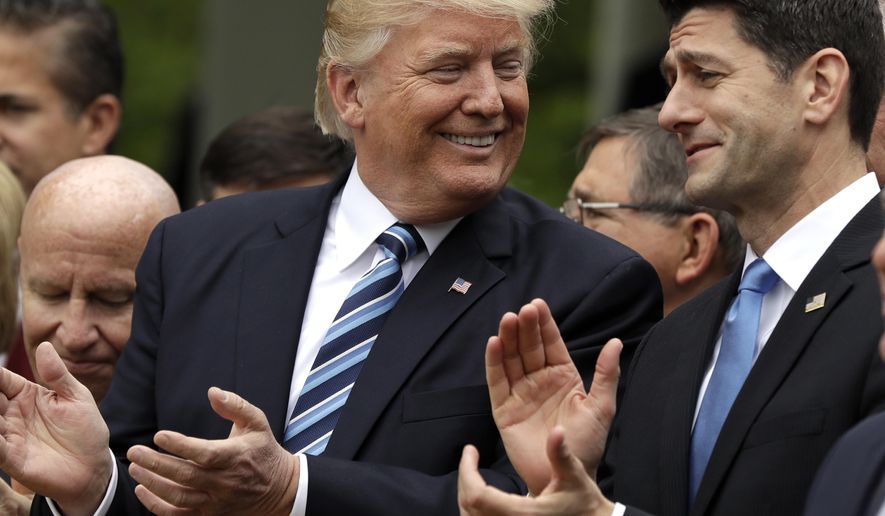Conservatives are cheering on the Trump administration’s reported plans to let any employer duck Obamacare’s contraceptive mandate by claiming a religious or moral objection.
The bold rollback was detailed Wednesday by Vox, which obtained a draft proposal that has enraged Democrats and some civil liberties groups who say a woman’s right to birth control is being threatened.
Under the leaked plan, employers who assert a good-faith objection to having their insurance plans pay for contraception would be exempt so long as they notify their employees of the change, the Health and Human Services Department says in a May 23 draft proposal.
For now, only houses of worship and certain grandfathered employers are exempt. Others must insure a range of contraceptives at no cost to female employees or, in some cases, sign an opt-out form. A Catholic order of nuns and other religious nonprofits are challenging that “accommodation” in court as itself making them complicit in what their churches teaches as sinful.
The Obama administration has fought the nuns in court, but the Trump administration has proved far more sympathetic to objectors.
“At long last the United States government has acknowledged that people can get contraceptives without forcing nuns to provide them,” said Mark Rienzi, senior attorney at Becket, which represents clients in religious liberty cases.
The White House budget office is reviewing the rule before it is published and thus implemented, and it is unclear if the plan has changed in the past week or if the administration is mulling tweaks.
Health and Human Services spokeswoman Alleigh Marre declined to weigh in Wednesday, saying the agency does not comment “on alleged drafts of documents.”
Yet HHS has confirmed it is revisiting the contraception mandate in the wake of Mr. Trump’s May 5 executive order bolstering religious liberty.
An outgrowth of the 2010 Affordable Care Act, the prior administration said most employers must provide insurance that cover 18 types of FDA-approved contraceptives, including birth control pills or the morning-after pill.
The Catholic Church and some other religions object to some or all contraception as sinful, and religious-based charities sued, saying they should be exempt, just as actual houses of worship are.
Advocates for the nonprofits said the new draft Trump rule would help out the charities, including the Little Sisters of the Poor, an order of Catholic nuns dedicated to caring for the elderly, which was the most prominent group to object to the Obama rules.
The American Civil Liberties Union, though, said it would be unfair to deny medical services to women based on the beliefs of their employers.
“The proposed regulation that was leaked today is the latest in a long line of efforts from the Trump administration to make it harder for millions of Americans, particularly women, to get the health care coverage they need,” said Louise Melling, the ACLU’s deputy legal director.
She vowed to sue if the Trump administration follows through on the draft.
Holly Lynch, a bioethics expert at Harvard Law School who closely tracks the debate, said the fact that HHS is mulling a full exemption is a “really important distinction” for affected employees.
Under the current rules, religiously affiliated charities had to sign a form saying they didn’t want to provide coverage, triggering a process where someone else would step in and offer coverage for free contraception. The Trump draft proposal would allow employers to either stick with that accommodation or to claim a full exemption.
It’s unclear how employers, particularly in the corporate world, will react, though Democrats predicted that millions of women would lose cost-free birth control.
“President Trump’s sickening plan to roll back women’s access to contraception would deny millions of women access to basic, preventative health care,” said House Minority Leader Nancy Pelosi. “The draft rule announced today attempts to tear away women’s control over their own private health decisions and put that control in the hands of employers and politicians.”
Becket argues that few companies, particularly large corporations, will seek an exemption, in part because it would require committing perjury if the assertion of religious or moral beliefs is unfounded.
Mr. Rienzi estimated that roughly 120,000-130,000 women would be impacted, and even then, most would work at places with clear positions on the subject.
He also said he’ll keep fighting in the courts, hoping to win an order that says the government cannot impose the mandate on religious objectors. Otherwise, he said, a future administration could try to revoke whatever changed Mr. Trump makes.
• Tom Howell Jr. can be reached at thowell@washingtontimes.com.




Please read our comment policy before commenting.